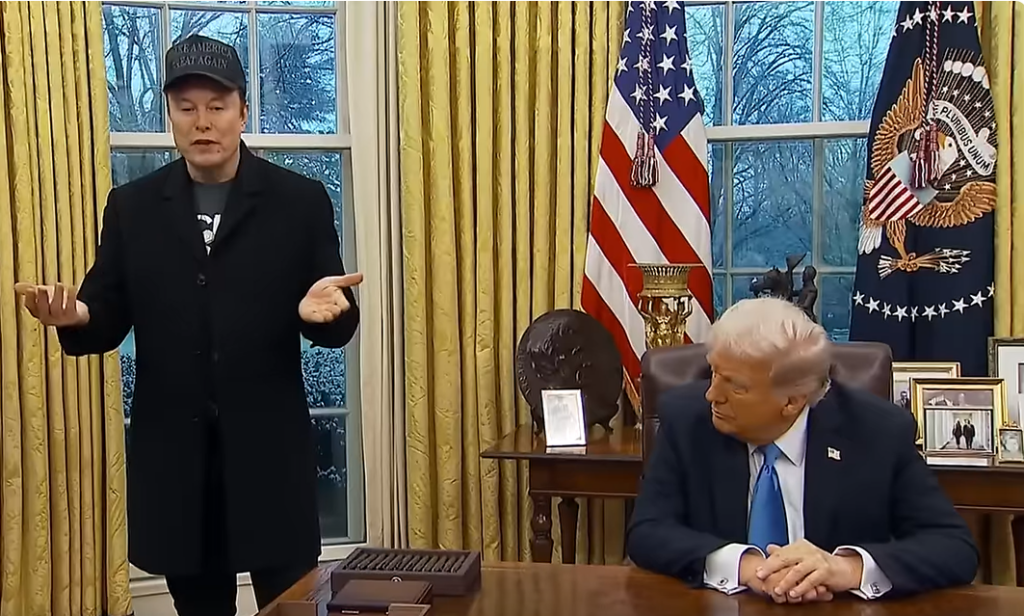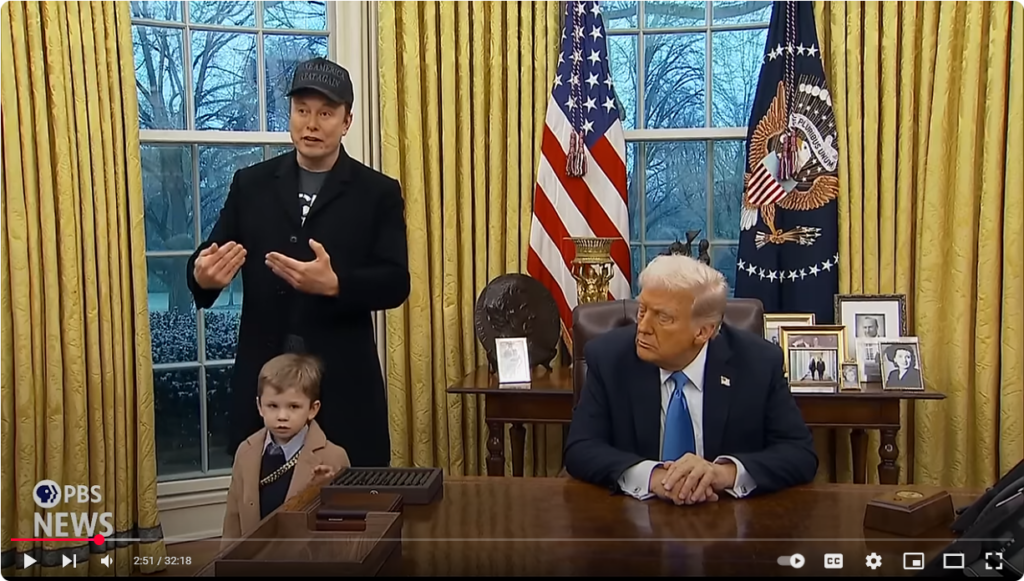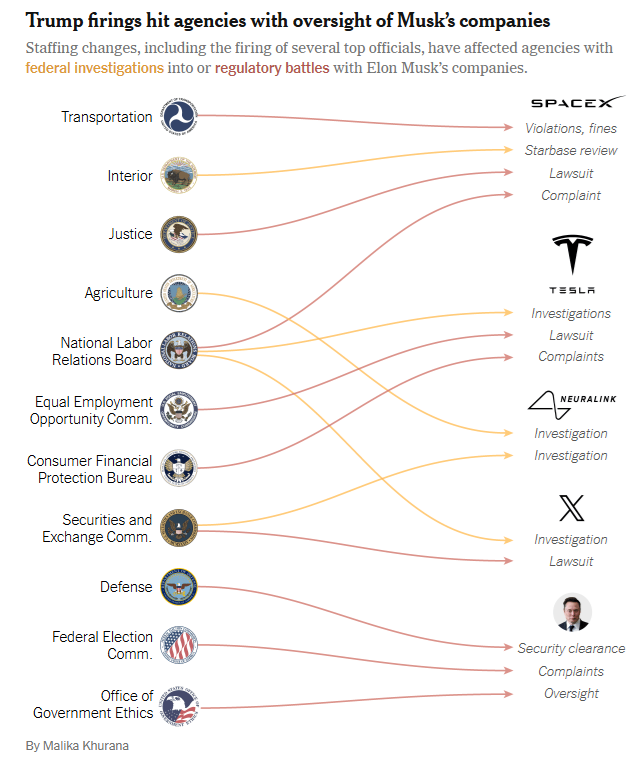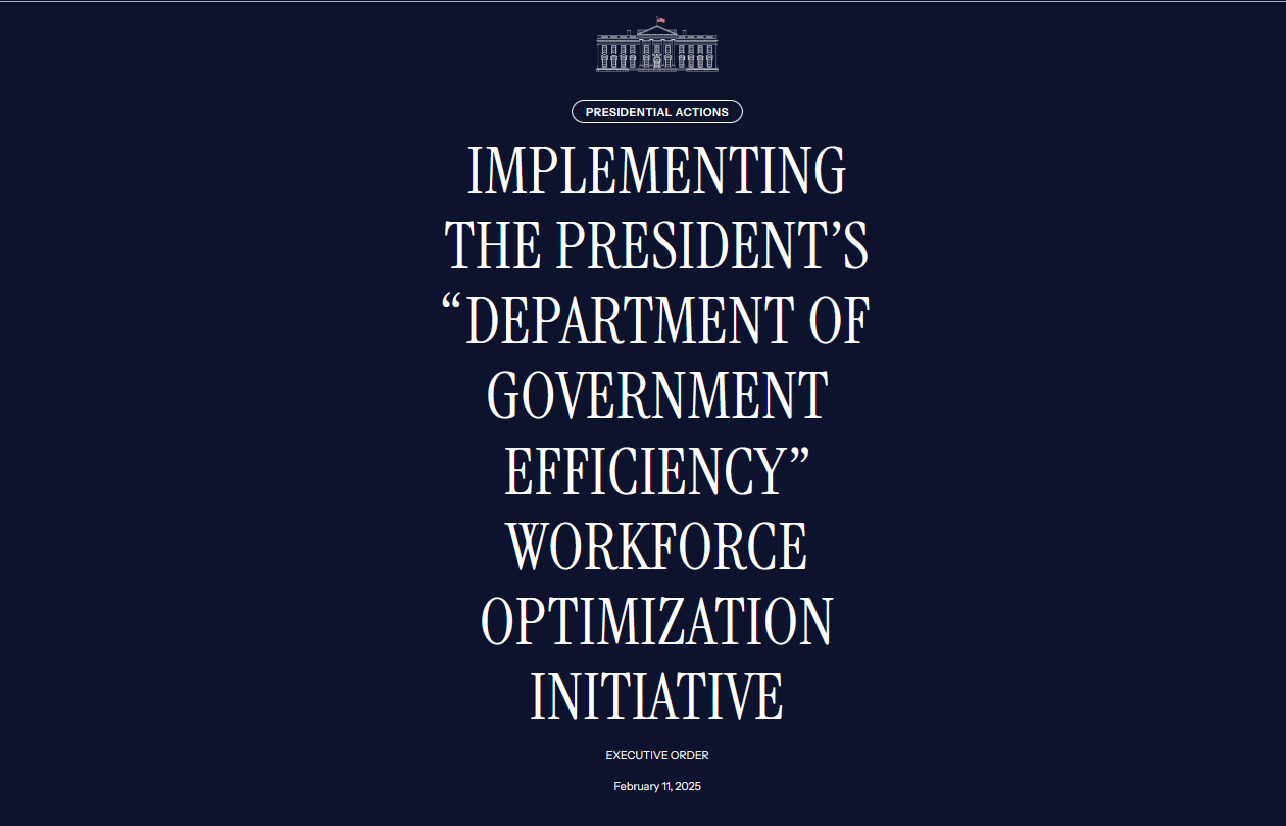Elon Musk – enabled by Donald Trump – is, as I’ve argued, on a tear to destroy the capacity of the federal government, through mass firings and agency shutdowns, to do what Americans expect of it. Beginning with USAID and the CFPB, the Trump administration is on the way to radically redirecting federal policy on immigration, climate, energy, tariffs, DEI and civil rights more broadly (most prominently: gender and transgender rights), health, science, education, consumer protection, and more.
In this post I argue that the courts will not stop Musk and DOGE.
Court challenges
First of all, these activities are unfolding according to plan — as designed by Project 2025. Democracy Docket quoted Jacqueline Simon, the public policy director of the American Federation of Government Employees (AFGE), on November 19, 2024:
Repeatedly throughout the Project 2025 chapters, they say to just move forward, go ahead and implement and worry about defending it in court later. Expect legal challenges, because they know what they’re doing is unlawful.
Other Trump opponents agree that the whirlwind of executive orders is unlawful, which has resulted in a blizzard of lawsuits to put a stop to the wanton destruction. (As of February 19, LAWFARE had identified more than fifty legal challenges to President Trump’s executive orders.)
Fox News legal analyst Jonathan Turley, on the other hand, is convinced that the administration holds strong cards in this battle. Asked by Brian Kilmeade about a conflict between the State of New York and Trump’s Department of Justice regarding immigration enforcement, Turley addressed the broader Trump strategy:
The interesting thing about this effort is it’s part of an overall effort to get these issues into court, get judicial review, establish what the navigational beacons are and going forward. I like that, because this is an administration on a mission. They want to not waste all the time that they saw just burn away in the first term and instead hit the ground running. So they’ve gone on this sort of full assault across the board. They’re virtually inviting people to take them to court and they also have strong arguments.
I am confident that whatever successes Trump’s critics achieve in court, they will not end Musk’s reckless crusade. The judiciary may nickel and dime Trump or Musk or Russell Vought on this or that — requiring shifting or recalibrating — but don’t expect nearly enough push back to halt the ongoing demolition.
Design matters
Never mind the great expansion of executive power in the half century since the Nixon era, when we were talking about the Imperial Presidency. Never mind that Congress has willingly acceded power over time to the chief executive. The reason Trump will win the most significant cases in court is because the laws were not designed for the present scenario, as illustrated in Lisa Rein’s illuminating “As Musk reshapes the government, some ask: Where are the guardrails?” in the Washington Post.
Both Congress (in passing legislation) and previous presidential administrations (in their rulemaking) “simply never envisaged” a president acting as recklessly, corruptly, and foolishly as Donald Trump has.
Here’s my quick and dirty summary of Rein’s review:
First, much of the most reckless conduct is not prohibited by law – it is within the president’s prerogative. Often statutory or regulatory prohibitions are aimed at other actors, not at a president. This is because Congress “simply never envisaged” a president acting as Trump, or the folks he has enabled, are doing.
“We’re at a point where things are so unprecedented that it’s not even close to what was envisioned by any of the statutes that exist,” said Nick Bednar, a professor at the University of Minnesota Law School who specializes in the civil service. “We do have guardrails. But they assume moderately bad behavior. They don’t assume complete efforts to assault the traditional institutions of government.”
What’s true of legislation is true as well of rulemaking within the executive branch. Cybercrimes and privacy laws focus on rogue personnel in government or foreign agents, not on the president, who has wide discretion to act.
Furthermore, the Project 2025 folks have identified rules that “never accounted for the manner in which this White House would use them.” An example: Congress granted presidents authority to hire “special government employees” – to assist in finding the right person for “hard-to-fill jobs, for example in science, technology and engineering.”
Congress did not foresee a billionaire, with conflicts of interest galore and egged on by thousands of fanboys on X, running rampant within the executive branch. And no matter how much we might object to DOGE acquiring sensitive information from federal departments and agencies, the president or his “cabinet secretaries – even acting ones” have the legal authority to permit this.
Further, “Trump officials have found ways to use old laws to their advantage to enact massive changes to the government that Congress did not anticipate when it enacted the post-Watergate civil service law in 1978.” The administration has repurposed that law, which allowed a president to exempt individuals from civil service protections and waive certain hiring procedures, to do something Congress never intended: reclassifying tens of thousands of civil servants – the easier to boot them out and replace them with partisan loyalists.
In each case, Congress passed legislation granting presidents broad authority; this president is acting on that authority in ways unimagined before Trump.
Finally, “Musk and his team have also taken advantage of legal bulwarks with unclear or weak enforcement standards.” In other words, even if they violate the law, in some instances there’s not much anyone can do about it.
Of course, the Supreme Court has the final say regarding judicial decisions, but the current supermajority is hardly prepared to block the wild Musk rampage.
The Roberts Court
The Republican majority on the Supreme Court ran roughshod over the Constitution to grant presidents immunity from criminal prosecution for laws intended to apply to everyone. This court will not stop Trump from his campaign of destruction, which no Republican dares question publicly.
Let’s first review what the Roberts Court ruled in Trump v. United States. Justice Sonia Sotomayer’s dissent clearly and crisply described the majority decision. In three brief passages:
Today’s decision to grant former Presidents criminal immunity reshapes the institution of the Presidency. It makes a mockery of the principle, foundational to our Constitution and system of Government, that no man is above the law.
Relying on little more than its own misguided wisdom about the need for “bold and unhesitating action” by the President, ante, at 3, 13, the Court gives former President Trump all the immunity he asked for and more. Because our Constitution does not shield a former President from answering for criminal and treasonous acts, I dissent.
. . .
Setting aside this evidence, the majority announces that former Presidents are “absolute[ly],” or “at least . . . presumptive[ly],” immune from criminal prosecution for all of their official acts. Ante, at 14 (emphasis omitted). The majority purports to keep us in suspense as to whether this11Cite as: 603 U. S. ____ (2024) immunity is absolute or presumptive, but it quickly gives up the game. It explains that, “[a]t a minimum, the President must . . . be immune from prosecution for an official act unless the Government can show that applying a criminal prohibition to that act would pose no ‘dangers of intrusion on the authority and functions of the Executive Branch.’ ” Ibid. (emphasis added). No dangers, none at all.
It is hard to imagine a criminal prosecution for a President’s official acts that would pose no dangers of intrusion on Presidential authority in the majority’s eyes.
. . .
Looking beyond the fate of this particular prosecution, the long-term consequences of today’s decision are stark. The Court effectively creates a law-free zone around the President, upsetting the status quo that has existed since the Founding. This new official-acts immunity now “lies about like a loaded weapon” for any President that wishes to place his own interests, his own political survival, or his own financial gain, above the interests of the Nation. Korematsu v. United States, 323 U. S. 214, 246 (1944) (Jackson, J., dissenting). The President of the United States is the most powerful person in the country, and possibly the world. When he uses his official powers in any way, under the majority’s reasoning, he now will be insulated from criminal prosecution. Orders the Navy’s Seal Team 6 to assassinate a political rival? Immune. Organizes a military coup to hold onto power? Immune. Takes a bribe in exchange for a pardon? Immune. Immune, immune, immune.
Let the President violate the law, let him exploit the trappings of his office for personal gain, let him use his official power for evil ends. Because if he knew that he may one day face liability for breaking the law, he might not be as bold and fearless as we would like him to be. That is the majority’s message today.
Even if these nightmare scenarios never play out, and I pray they never do, the damage has been done. The relationship between the President and the people he serves has shifted irrevocably. In every use of official power, the President is now a king above the law.
Donald Trump, via his special government employee Elon Musk, is engaged in “bold and unhesitating action.” This is what the Republican majority sought to preserve in its off-the-rails immunity decision. This is, for the partisan Republican majority on the court, reason to celebrate.
It is preposterous to think that the Roberts Court, after giving Trump immunity from criminal prosecution — including for ordering the nation’s military to assassinate a political rival — would stand in the way of mass purges of civil servants and shuttering departments and agencies. That’s a nonstarter.
The administration’s Trump card
A few words on defying the judiciary: In September 2021, JD Vance offered advice to Donald Trump (anticipating his 2024 election):
I think that what Trump should do – like, if I was giving him one piece of advice – fire every single mid-level bureaucrat, every civil servant in the administrative state, replace them with our people. And when the courts – ’cause you will get taken to court – and then when the courts stop you, stand before the country, like Andrew Jackson did, and say, “The chief justice has made his ruling, now let him enforce it.”
More recently Vice President Vance and Elon Musk have both challenged judicial authority over the executive branch. So has Trump himself: “But judges should be ruling. They shouldn’t be dictating what you’re supposed to be doing. And why is somebody saying that you’re not allowed to?”
Some commentators have suggested that Chief Justice John Roberts would be certain to rule against Trump were the president to openly flout a judicial ruling. Roberts would assert, so say these observers, the authority of the judicial branch. But I believe this presumption fails to account for a trump card that the president holds.
Trump is a master of the politics of domination and ritual humiliation. The public spectacle of DOJ dropping the prosecution of Eric Adams, which resulted in more casualties than the Saturday Night Massacre, is instructive. The quid pro quo was thoroughly corrupt, while the stakes, with a mayor whose term will end in a matter of months, were much lower than in the Nixon case.
The Adams episode was thoroughly brazen. Just like the January 6 pardons of the criminals who attacked the Capitol police. Just like the Pete Hegseth, Kash Patel, Tulsi Gabbard, and Robert Kennedy nominations; the pivot to what Europeans have dubbed the Trump-Putin Axis; the Big Lie that Trump won the 2020 presidential election. And just like, of course, Musk’s butchery of infrastructure at the heart of the government of the United States.
Trump is accustomed to getting his way. Loyalty to him is paramount. Defiance is costly.
The lesson for Roberts: don’t get in Trump’s way. The president would delight in humiliating the judicial branch, just as he has the legislative branch. It would send a powerful signal. It would raise the president’s popularity among the base of the Republican Party (which the five men on the Roberts Court have served faithfully throughout their careers). It would wound the Supreme Court.
Furthermore, if Trump were to defy the Supreme Court, this might backfire on the Republican Party.
Roberts, if he wishes to avoid humiliation (and not disadvantage the GOP), may erect feeble roadblocks (which will invite workarounds) to Trump, but the Supreme Court will not rule against Trump when the stakes are high.





